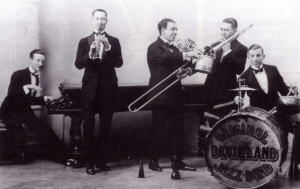Stories of Standards: “Royal Garden Blues”
 Tune in weekday mornings for Stories of Standards to hear our favorite versions of “Royal Garden Blues.” Rodney Franks presents Stories of Standards Monday through Friday at 7:50 and 8:50 a.m. beginning Monday, December 2nd!
Tune in weekday mornings for Stories of Standards to hear our favorite versions of “Royal Garden Blues.” Rodney Franks presents Stories of Standards Monday through Friday at 7:50 and 8:50 a.m. beginning Monday, December 2nd!
Stories of Standards is sponsored by ListenUp.
“Royal Garden Blues” was written in 1919 by Spencer Williams and Clarence Williams. As Clarence Williams (not related to Spencer) was the publisher, it is thought that he received credit for this. The song is considered to be one of the first popular songs based on a riff. It first hit the charts in 1921 and was added to the big band repertoire in the 1930s, played by Tommy Dorsey and Benny Goodman. The tune was named for the Royal Garden Dance Hall in Chicago. George Morrison’s Jazz Orchestra, long resident at Denver’s Albion Hotel (17th and Stout), recorded three takes of “Royal Garden Blues” on April 2, 1920, but none of these were ever released.
Spencer Williams (10/14/1889-7/14/1965) composer, pianist, and singer, born in New Orleans, had moved to Chicago by 1907 and to New York City by 1916. Among the many hits he wrote were “Basin Street Blues”, “I Ain’t Got Nobody”, “I’ve Found a New Baby”, “She’ll Be Comin’ Round That Mountain”, “Everybody Loves My Baby” and “Tishomingo Blues”. From 1925 to 1928 he toured Europe with various bands, with his chief collaborators being “Fats” Waller and Josephine Baker (at the Folies Bergere in Paris). In 1932 he moved to London and in 1951 to Stockholm. He moved to New York in 1957 and was posthumously inducted into the Songwriters Hall of Fame in 1970.
Clarence Williams (10/6/1898 or 10/8/1893 to 11/6/1965) was a pianist, composer, promoter, vocalist, theatrical producer, and publisher. Born in Plaquemine, Louisiana, of Choctaw and Creole heritage, he ran away from home as a 12-year-old, having joined Billy Kersands’ Traveling Minstrel Show, He then moved to New Orleans, where he worked shining shoes and doing odd jobs before becoming known as a singer and master of ceremonies. By the early 1910s he was well-known for playing piano and had started composing new tunes by 1913. He went to Chicago in anticipation of the exodus of talent from New Orleans following the closure of Storyville and purchased a music store. He acted as a promoter and producer and publisher until 1943, when he sold his publishing company’s catalog of over 20,000 songs to Decca for a reported $50,000. Until he lost his sight in 1956, the result of being hit by a cab, Williams spent most of his time composing.
Become a Member
Join the growing family of people who believe that music is essential to our community. Your donation supports the work we do, the programs you count on, and the events you enjoy.
Download the App
Download KUVO's FREE app today! The KUVO Public Radio App allows you to take KUVO's music and news with you anywhere, anytime!
